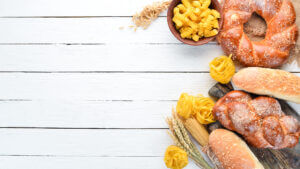Author: Kim Plaza
The estimated prevalence of IBS in the UK is between 10% and 20% and most commonly affects people aged between 20 and 30 years.1 Whilst there is no current cure for IBS, there may be ways to curb the symptoms. Want to learn how to prevent IBS? Give these nutritionist-approved tactics a try.
1. Identify any food sensitivities or intolerances

If you think that you may be intolerant to some foods, try removing these from your diet for several weeks, as this could provide an indication as to whether they are problematic for you. Some of the more common foods that people are sensitive to are dairy products and grains (particularly wheat). Although everyone knows about the benefits of fiber for regular digestion, those with an oversensitive gut lining and imbalanced gut flora will find some grains, vegetables, and legumes difficult to digest, due to their fermentable carbohydrate content. Avoiding gassy fruits and vegetables that contain fermentable carbohydrates (FODMAPS) that are poorly absorbed in a damaged small intestine may help reduce excess gas.1 Nutritional practitioners can help you in identifying and managing food sensitivities (including a low FODMAP diet).
2. Take some time to eat

Digestion starts in the brain, often called the ‘cephalic phase’. This phase is triggered by various cues, such as the sight and smell of food. It allows our body to anticipate eating and explains why our mouth begins to water when we think about our next meal! The cephalic phase initiates the body to release digestive juices and enzymes, ready to break down the various carbohydrates, fats, and proteins. If we do not give our body sufficient time to stimulate the cephalic phase, we may not be digesting our food properly, which may then lead to increased gas and bloating as well as constipation or loose stools. Try and avoid eating on-the-go, and think about what you are eating, without distractions. The cephalic phase is good reason why cooking from scratch is beneficial, as we smell and see the food being prepared before we consume it.
3. Take a note of stress levels

Here’s how to prevent IBS by managing your stress levels. Research has highlighted a link between digestive and mental health, with IBS being a significant factor in conditions such as anxiety and mood disorders.2 Developing research into the gut-brain axis is revealing that our digestive system responds to stress hormones produced in the brain, such as cortisol.3 This implies that overproduction or a dysregulation of stress hormones (perhaps due to chronic stress or anxiety) may impact the function of our digestive system. Trying out different strategies such as meditation, cognitive behavioral therapy, or hypnotherapy may provide some benefit and increase remission time for patients.4,5
4. Limit caffeine intake

Many people rely on caffeine from coffee, tea, sports drinks, cola, and even green tea to give them a kick start in the morning and see them through the day. Whilst antioxidants in good quality coffee and tea can offer some benefits to the gut (increasing beneficial bacteria levels), too much caffeine has a stimulant effect, triggering the fight or flight response and the release of stress hormones. This is likely to have a negative impact on IBS symptoms and many sufferers (especially those who suffer with IBS-D) may see an improvement in symptoms if they reduce their tea and coffee intake.1
5. Stay hydrated

Staying well hydrated throughout the day is important to help soften stools and make them easier to pass. Those suffering with constipation type IBS (IBS-C) often find an improvement in symptoms by increasing their water intake. It’s also important that IBS diarrhea (IBS-D) sufferers drink enough to replenish water lost from diarrheal episodes. Aim to drink around 2 liters of water a day. This can include herbal teas.6
Can an elimination diet help?
Elimination diets are often popular with IBS patients, especially given than between 70% and 89% of people with IBS report exacerbation of symptoms with specific foods.7 A number of different elimination diets may be recommended by nutrition practitioners, including reduction or exclusion of carbohydrates, fermentable foods, gluten, or chemicals and additives (such as histamines, glutamates and caffeine).7,8 There is currently limited research in the area of elimination diets for IBS and this may be because dietary intervention studies can be quite difficult to accurately measure. Most published trials report positive results for elimination diets in IBS, however further research is needed.9,10
Most elimination diets have two phases, the elimination phase and the reintroduction phase. A person may be advised to eliminate FODMAP foods for instance (fermentable oligosaccharides, disaccharides, monosaccharides, and polyols), which entails avoiding the consumption of foods that contain these kinds of short-chain carbohydrates (such as garlic, onions, mushroom, apples, bread and many legumes etc.) A common length of time to follow an elimination diet may range between three and eight weeks.
Once the elimination phase is done, you may start to slowly reintroduce some of the foods that were avoided, a registered nutrition practitioner will be able to help with this. It is helpful to track which foods are consumed and see if they are well-tolerated, with a food-symptom diary. It usually starts with a small amount of food from one food group being reintroduced separately (if groups of foods were eliminated – as in the low FODMAP diet). If symptoms do not return, then a larger amount of food is consumed. As a person completes the reintroduction phase, they should have a list of foods to restrict, eat occasionally, or consume in smaller amounts.
Nutritional changes for IBS sufferers
Some general principles of healthy eating may help with symptoms of IBS (bloating, constipation or diarrhea) and therefore may be a good place to start. Preparing and cooking meals from scratch may be helpful for a variety of reasons; including stimulating the cephalic phase, but also encourage us to enjoy cooking more and influence psychological wellbeing, a potential help to combat stress and anxiety.
Using wholefoods in our cooking reduces additives, sweeteners, and preservatives that are commonly found in convenience foods. IBS patients often report an increase in symptoms when consuming various additives and sugars, such as mannitol, high-fructose corn syrup, and monosodium glutamate.11 It has been suggested that these additives alter the gut microbiome and therefore differences in bacterial diversity (dysbiosis) and inflammation have been seen in those with IBS compared to controls.11
Looking after our gut health may also be helpful, whether you suspect you have IBS or not, a healthy microbiome may support good gut and immune defenses, as well as influence our mood via the gut-brain axis. Trying a variety of fermented foods (if they are well tolerated), such as sauerkraut, kefir, and kombucha may help to support a diverse gut microbiome. Alternatively, live bacteria can be taken as a supplement. Bio-Kult Advanced was used in a large-scale trial, where a significant reduction in IBS-D symptoms was found, with 34% of patients symptom-free at the end of the four-month trial.12
IBS diagnosis
Once a doctor has ruled out other potential causes, a diagnosis of IBS may be given if the individual has abdominal pain or discomfort that is either relieved by a bowel movement or is associated with an altered bowel frequency or stool form. The Bristol Stool Chart is often used as a tool to gather this information. Additional criteria are used to receive a diagnosis of IBS, including bloating (distension, tension, or hardness) and straining or urgency when passing a stool. Other symptoms may also be taken into account, such as lethargy, nausea and backache.1 There is no official test for IBS, however some additional tests may be carried out, such as ultrasound, hydrogen breath test, and a colonoscopy.1
Long-term symptom management
Some people find that they may need to adapt their lifestyle and levels of physical activity. High intensity exercise for example, may aggravate IBS symptoms, whereas mild-to-moderate exercise may improve some symptoms (especially those with IBS-C). Physical activity may help symptoms by encouraging peristalsis, which is the natural muscular propulsion of contents through the digestive tract. This may help to relax the bowel and ease symptoms. Additionally, taking part in some form of physical activity, whether it be a gentle swim or walking, can be helpful for our mental health and may potentially reduce stress and anxiety levels.13
Timing of meals may also be a necessary element, try to stick to a regular meal pattern and avoid missing meals, it may be useful in regulating blood sugar balance; possibly making healthier food choices easier. Having a regular sleeping pattern may also support the regulation of stress hormones and energy levels. Disturbed sleep is often reported in IBS patients and some research has associated poor sleep quality with more severe symptoms.14
IBS and medication
There is no single medicine that works for every person with IBS, your GP or pharmacist can give you advice regarding suitable medicines to alleviate IBS symptoms. Some popular medicines include peppermint oil capsules or mebeverine hydrochloride, these are known as anti-spasmodic medicines which reduce intestinal motility and therefore can be helpful for abdominal pain.15 Alternatively, trying a live bacteria supplement for at least one month may be helpful,16 such as Bio-Kult Advanced Multi-strain.
The rise of IBS
Research is suggesting that the incidence of IBS is on the rise in more ‘westernized’ countries.17 This could be related to some of the characteristics commonly associated with western diets and lifestyles. One study concluded that; a ‘western’ dietary pattern (which correlated with the consumption of fatty and sugary products and snacks) was associated with a moderate increased risk of IBS.18 The pathophysiology of IBS is complex though and incompletely understood. Risk factors such as genetics, diet, and the gut microbiome play a role, but can be influenced by geography, societal and cultural differences.19 As more developing counties adopt a westernized lifestyle, we may see an increased prevalence and therefore an increased awareness of IBS.19 Additionally, as IBS is suggested to be associated with stress, the increasing frequency of stress-related illness in younger generations may mean that IBS becomes a greater health problem for Millennials compared to other generations.19
1 Introduction | Irritable bowel syndrome in adults: diagnosis and management | Guidance | NICE. https://www.nice.org.uk/guidance/cg61/chapter/introduction (accessed July 19, 2021).
2 Zamani M, Alizadeh-Tabari S, Zamani V. Systematic review with meta-analysis: the prevalence of anxiety and depression in patients with irritable bowel syndrome. Aliment Pharmacol Ther 2019; 50: 132–43.
3 Vodička M, Ergang P, Hrnčíř T, et al. Microbiota affects the expression of genes involved in HPA axis regulation and local metabolism of glucocorticoids in chronic psychosocial stress. Brain Behav Immun 2018; 73: 615–24.
4 Aucoin M, Lalonde-Parsi M-J, Cooley K. Mindfulness-Based Therapies in the Treatment of Functional Gastrointestinal Disorders: A Meta-Analysis. Evid Based Complement Alternat Med 2014; 2014. DOI:10.1155/2014/140724.
5 Lee HH, Choi YY, Choi M-G. The Efficacy of Hypnotherapy in the Treatment of Irritable Bowel Syndrome: A Systematic Review and Meta-analysis. J Neurogastroenterol Motil 2014; 20: 152.
6 Healthy hydration guide for adults and teenagers – British Nutrition Foundation. https://www.nutrition.org.uk/healthyliving/hydration/adults-teens.html (accessed July 19, 2021).
7 Werlang ME, Palmer WC, Lacy BE. Irritable Bowel Syndrome and Dietary Interventions. Gastroenterol Hepatol (N Y) 2019; 15: 16.
8 Lacy BE. The Science, Evidence, and Practice of Dietary Interventions in Irritable Bowel Syndrome. Clin Gastroenterol Hepatol 2015; 13: 1899–906.
9 Moayyedi P, Quigley EMM, Lacy BE, et al. The Effect of Dietary Intervention on Irritable Bowel Syndrome: A Systematic Review. Clin Transl Gastroenterol 2015; 6: e107.
10 Algera J, Colomier E, Simrén M. The Dietary Management of Patients with Irritable Bowel Syndrome: A Narrative Review of the Existing and Emerging Evidence. Nutrients 2019; 11. DOI:10.3390/NU11092162.
11 Rinninella E, Cintoni M, Raoul P, Gasbarrini A, Mele MC. Food Additives, Gut Microbiota, and Irritable Bowel Syndrome: A Hidden Track. Int J Environ Res Public Health 2020; 17: 1–15.
12 Ishaque SM, Khosruzzaman SM, Ahmed DS, Sah MP. A randomized placebo-controlled clinical trial of a multi-strain probiotic formulation (Bio-Kult®) in the management of diarrhea-predominant irritable bowel syndrome. BMC Gastroenterol 2018; 18: 71.
13 Aylett E, Small N, Bower P. Exercise in the treatment of clinical anxiety in general practice – a systematic review and meta-analysis. BMC Health Serv Res 2018; 18: 559.
14 Tu Q, Heitkemper MM, Jarrett ME, Buchanan DT. Sleep disturbances in irritable bowel syndrome: a systematic review. Neurogastroenterol Motil 2017; 29: e12946.
15 Irritable bowel syndrome | Treatment summary | BNF content published by NICE. https://bnf.nice.org.uk/treatment-summary/irritable-bowel-syndrome.html (accessed July 19, 2021).
16 Irritable bowel syndrome (IBS) – Diet, lifestyle and medicines – NHS. https://www.nhs.uk/conditions/irritable-bowel-syndrome-ibs/diet-lifestyle-and-medicines/ (accessed July 19, 2021).
17 Corsetti M, Whorwell P. The global impact of IBS: time to think about IBS-specific models of care? Therap Adv Gastroenterol 2017; 10: 727.
18 Buscail C, Sabate J-M, Bouchoucha M, et al. Western Dietary Pattern Is Associated with Irritable Bowel Syndrome in the French NutriNet Cohort. Nutrients 2017; 9: 1–13.
19 Black CJ, Ford AC. Global burden of irritable bowel syndrome: trends, predictions and risk factors. Nat Rev Gastroenterol Hepatol 2020 178 2020; 17: 473–86.
BSc, MSc Nutritional Advisor, Bio-Kult (www.bio-kult.com)
Having issues with IBS? Read about The Power Of Probiotics.






